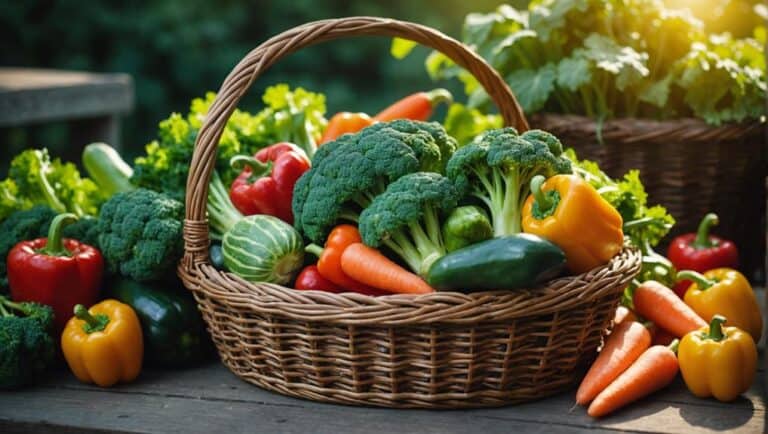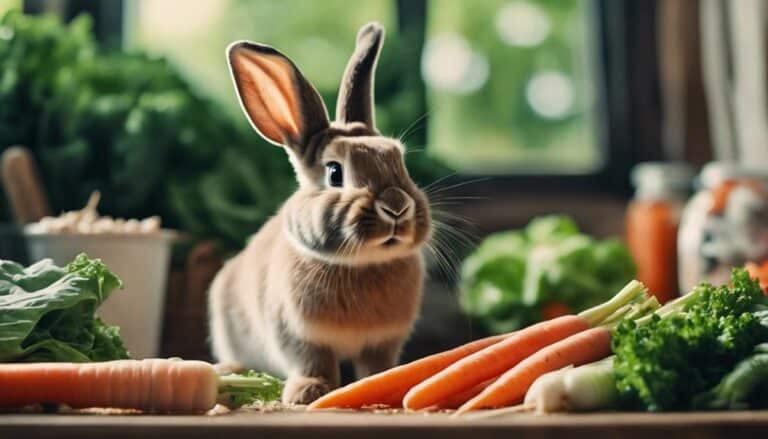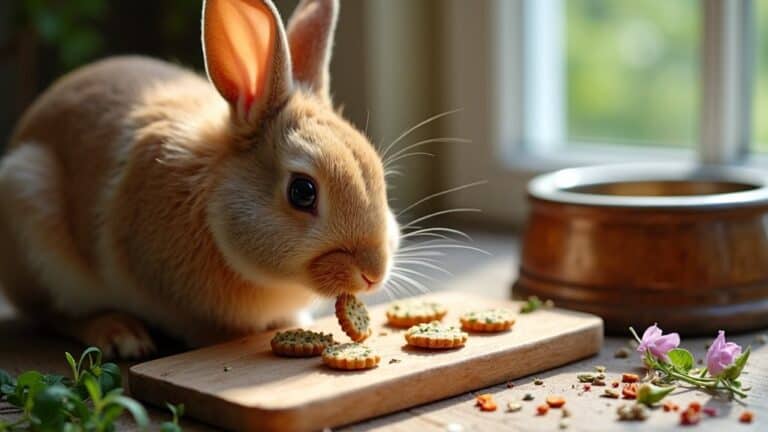When it comes to balancing bunny nutrition, it's like mixing the perfect salad dressing – a delicate blend of ingredients tailored just right for top health.
But how do you make sure your fluffy friend gets all the nutrients they need without overdoing it?
Stay tuned to uncover the key to maintaining a well-balanced diet for your bunny, securing their vitality and well-being for years to come.
Contents
- 1 Key Takeaways
- 2 Importance of Balanced Bunny Nutrition
- 3 Understanding Bunny Dietary Requirements
- 4 Incorporating Hay in Bunny Diet
- 5 Monitoring Hay Consumption for Bunnies
- 6 Adjusting Hay Intake for Optimal Nutrition
- 7 Potential Health Issues With Hay Diets
- 8 Seeking Professional Advice for Bunny Nutrition
- 9 Frequently Asked Questions
- 10 How Can I Ensure My Rabbit’s Diet Is Properly Balanced?
- 11 Conclusion
Key Takeaways
- Balanced bunny nutrition relies on hay, water, fresh greens, and hay pellets for overall health.
- Fiber-rich diet supports digestion and prevents obesity in bunnies.
- Hay is crucial for dental health, gut motility, and age-appropriate nutrition.
- Regular monitoring and adjustments in hay consumption ensure optimal health and well-being for bunnies.
Importance of Balanced Bunny Nutrition
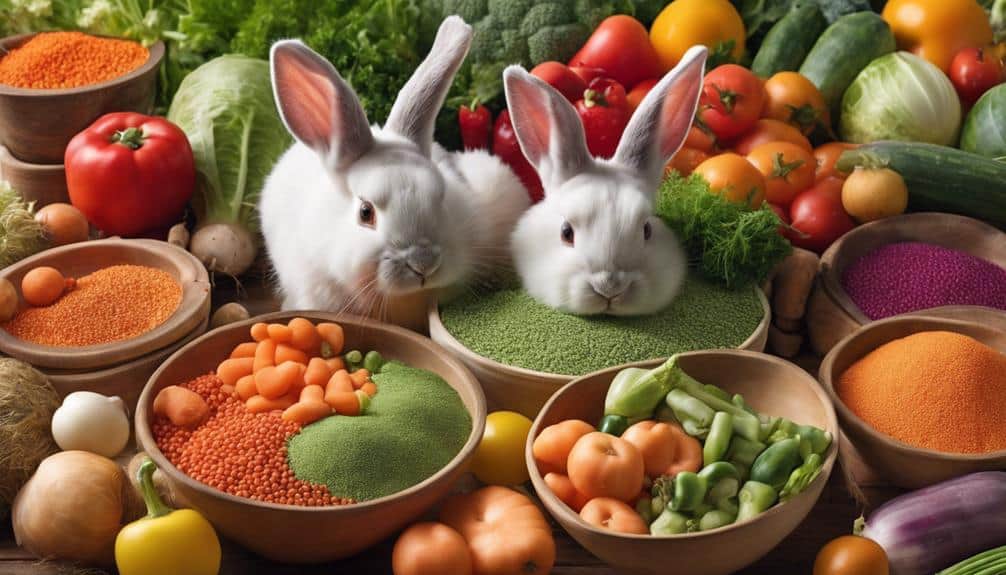
Ensuring high-quality health and well-being in pet rabbits starts with understanding the critical importance of balanced bunny nutrition. A rabbit's diet plays a pivotal role in maintaining their overall health. Water is vital for digestion and regulating body temperature. It's recommended to provide fresh, clean water at all times to prevent dehydration.
Another essential aspect of a rabbit's diet is their teeth, which grow continuously. A balanced diet that includes a variety of hay helps wear down their teeth naturally, preventing dental issues. Hay also provides essential fiber for proper digestion.
Incorporating fresh greens into a rabbit's diet adds essential vitamins and minerals. However, it's important to limit the amount of veggies and fruits to avoid upsetting their delicate digestive system. Additionally, hay pellets can be given in moderation to supplement their diet with additional nutrients.
Understanding Bunny Dietary Requirements
Understanding the dietary requirements of bunnies involves providing a high-fiber diet to support their gastrointestinal health. A balanced diet for rabbits consists of a variety of hay, fresh greens, and limited fruits. Hay, being the cornerstone of their diet, aids in proper digestion and maintains dental health.
To make sure a healthy bunny diet, it's important to avoid high-sugar and high-fat foods that can lead to obesity and health issues. Additionally, fresh water should always be readily available to keep your rabbit hydrated and aid in digestion.
Monitoring your rabbit's food intake regularly and adjusting portions according to their individual needs is essential for maintaining a well-balanced diet. By following these guidelines and understanding the nutritional requirements specific to rabbits, you can promote their overall health and well-being.
Incorporating Hay in Bunny Diet
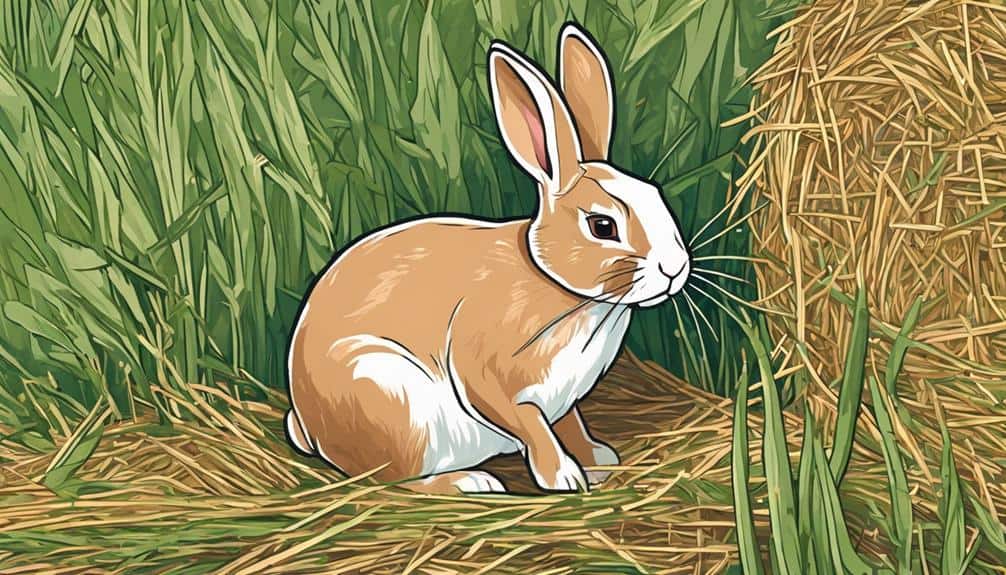
How integral is hay in a bunny's diet for maintaining peak health and well-being?
Hay plays an important role in a rabbit's diet, providing essential fiber that supports their digestive system and overall health. Here are three key reasons why incorporating hay is essential for your bunny:
- Fiber-Rich Diet: Hay serves as a primary source of fiber for rabbits, aiding in digestion and preventing gastrointestinal issues. The roughage in hay helps maintain proper gut motility, reducing the risk of stasis and other digestive problems.
- Dental Health: Chewing on hay promotes natural wear of a rabbit's teeth, preventing dental issues that can arise from overgrown teeth. This is particularly important for rabbits, as their teeth continuously grow, and hay helps keep them at an appropriate length.
- Age-Appropriate Nutrition: Baby bunnies benefit from softer hays like alfalfa, while adult rabbits should be fed timothy, orchard grass, or oat hay. Providing the right type of hay for your bunny's age ensures they receive the appropriate nutrition for their stage of life.
Monitoring Hay Consumption for Bunnies
You should closely track your bunny's hay intake to guarantee they're consuming an amount equivalent to the size of their body daily. Monitoring their dietary hay intake is crucial for maintaining the best gut motility and preventing dental issues.
Observing their hay consumption patterns regularly can help you detect any changes in their health or appetite.
Hay Intake Tracking
To guarantee your bunny's digestive health and overall well-being, closely monitoring their daily hay intake is essential. Here are three key points to contemplate when tracking your rabbit's hay consumption:
- Assure Adequate Fiber Intake: Monitoring hay consumption helps assure your bunny is getting enough fiber for proper digestion.
- Detect Health Issues Early: Changes in hay consumption can signal potential health problems or dietary preferences in your rabbit.
- Prevent Dental and Gastrointestinal Problems: Regularly tracking hay intake can help prevent dental issues and gastrointestinal stasis in bunnies.
Dietary Hay Monitoring
Monitoring your rabbit's hay consumption is essential for guaranteeing their dietary needs are met and detecting any potential health issues early on. Hay is vital for fiber intake, which aids in proper digestion and maintains ideal dental health for your bunny. By keeping track of how much hay your rabbit eats daily, you can make sure they're receiving an adequate amount of fiber in their diet.
A decrease in hay consumption might signal a health problem or dental issue that requires attention. Regularly replacing the hay in your bunny's enclosure and monitoring any leftovers can provide valuable insights into their eating habits, allowing you to make necessary adjustments to their diet or seek veterinary care promptly if needed.
Hay Consumption Observation
Observing your bunny's hay consumption patterns throughout the day and night is essential for ensuring they receive adequate fiber intake in their diet. To effectively monitor hay consumption and support your bunny's health, consider the following:
- Consistency: Bunnies should consistently consume hay throughout the day and night to maintain proper digestive function.
- Alert for Changes: Any sudden decrease in hay consumption could indicate a health issue that requires immediate attention.
- Adjustment: By observing hay intake levels, you can make necessary adjustments to their diet to ensure balanced nutrition and overall well-being.
Monitoring hay consumption is a pivotal aspect of health monitoring for your bunny, allowing you to provide top-notch care and support their dietary needs efficiently.
Adjusting Hay Intake for Optimal Nutrition
Adjusting hay intake for best nutrition in bunnies requires careful consideration of their age, weight, and activity level. Hay is a vital component of a rabbit's diet, providing essential fiber for digestive health, dental wear, and overall well-being. Young bunnies benefit from alfalfa hay due to its higher protein and calcium content, while adult bunnies should be fed timothy or grass hay for the best nutrition.
Monitoring and adjusting hay intake is key to preventing obesity, dental issues, and gastrointestinal problems in bunnies. Hay should make up the majority of a rabbit's daily food intake to ensure a balanced nutrition plan. By adjusting hay intake based on your bunny's specific needs, you can help them maintain a healthy weight, promote proper digestion, and support their overall well-being.
Remember to consult with a veterinarian for personalized advice on adjusting hay intake to meet your bunny's individual requirements.
Potential Health Issues With Hay Diets
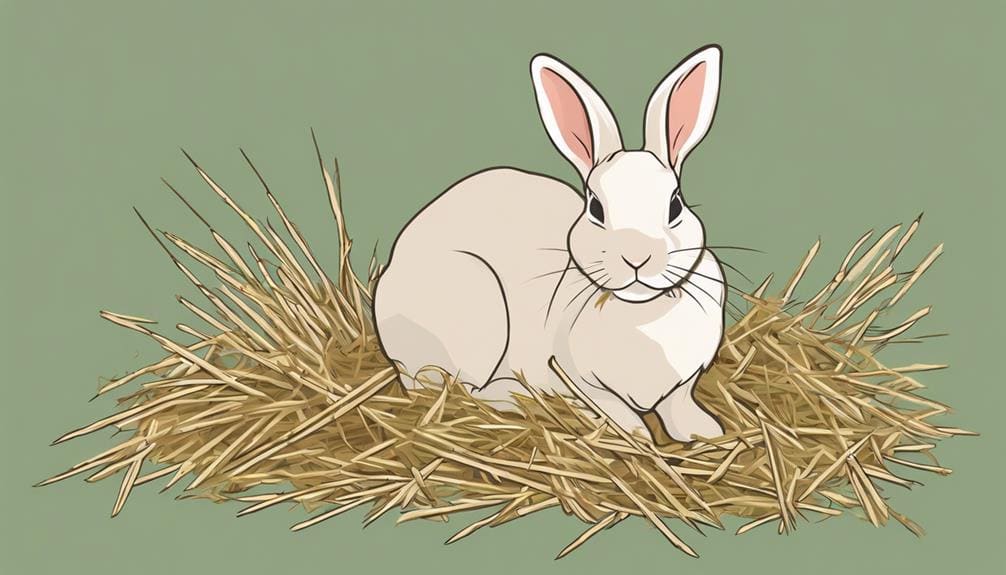
Ensuring a rabbit's diet includes sufficient hay is essential to avoid potential health issues associated with inadequate fiber intake. When it comes to a hay-based diet for rabbits, the following points are critical to consider:
- Gastrointestinal Stasis: Hay plays a vital role in maintaining proper gut motility in rabbits. Without enough fiber from hay, rabbits are at risk of developing gastrointestinal stasis, a condition where the gut slows or stops moving, leading to serious health complications.
- Dental Health: Rabbits' teeth continuously grow, and chewing hay helps wear down their teeth naturally. A lack of hay in their diet can result in dental issues such as malocclusion, where the teeth become misaligned, causing pain and difficulty eating.
- Overall Well-being: Incorporating hay into a rabbit's diet isn't just about preventing specific health problems but also about promoting their overall well-being. The fiber in hay aids in digestion, prevents hairballs, and ensures rabbits receive essential nutrients for vitality and longevity. Prioritizing a hay-based diet is key to keeping your bunny healthy and happy.
Seeking Professional Advice for Bunny Nutrition
When seeking professional advice for balancing your bunny's nutrition, consulting a veterinarian specializing in exotic pets is essential. A specialized vet can offer personalized recommendations tailored to your rabbit's specific dietary needs. They'll consider factors such as your bunny's age, weight, health status, and any existing health concerns to provide guidance on the ideal diet.
This includes suggesting suitable hay types, greens, and pellet brands that align with your bunny's nutritional requirements. Your vet can make sure that your rabbit's daily diet is well-balanced, promoting the best possible health and preventing any potential nutritional deficiencies. Seeking professional advice also allows you to address any dietary challenges, allergies, or sensitivities that your bunny may have, ensuring a thorough and appropriate diet plan.
Frequently Asked Questions
What Is a Balanced Diet for a Rabbit?
To maintain a rabbit's health, make sure 80% of their diet consists of hay varieties, 15% fresh veggies like leafy greens, and limited fruits. Pellet options can supplement but shouldn't dominate to avoid obesity. Best nutrition equals a happy bunny.
What Is the Key to Keeping Rabbits Healthy?
To keep rabbits healthy, preventive care is essential. Establish an exercise routine and provide necessary vitamins. Regular vet check-ups aid in tailoring nutrition plans. Avoid sudden dietary changes, offer a balanced diet, and monitor food intake.
What Is the Most Important Nutrient for a Rabbit?
Are you aware that the most critical nutrient for a rabbit is fiber intake? It aids in digestion, dental health, and overall well-being. Assure your bunny's diet includes plenty of hay and grass to maintain peak gut motility and prevent health issues.
How Do I Fix My Rabbits Diet?
To fix your rabbit's diet, begin with dietary changes. Make sure hay quality is excellent and offer a variety of pellets. Monitor weight and consult a vet for tailored advice. Gradual changes and limiting sugary foods will keep your bunny healthy.
How Can I Ensure My Rabbit’s Diet Is Properly Balanced?
When it comes to upgrading your rabbit’s diet, ensure a proper balance of hay, fresh vegetables, and pellets. Limit fruit and treats, and provide clean water at all times. Monitor your rabbit’s weight and adjust portion sizes as needed. Consult with a veterinarian for dietary recommendations.
Conclusion
To balance bunny nutrition involves understanding their dietary needs and providing a variety of foods to guarantee good health. By incorporating hay as a significant portion of their diet, monitoring portion sizes, and seeking professional advice when needed, you can maintain a healthy and balanced diet for your furry friend.
Remember, a well-rounded diet is essential for your bunny's overall well-being and longevity.

